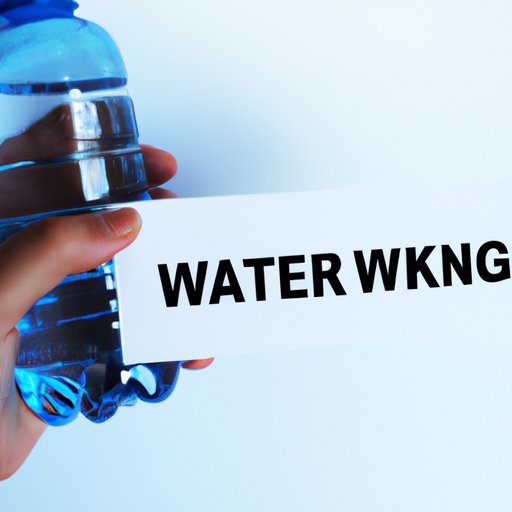
Introduction
Staying hydrated is crucial for overall health and wellbeing. Water plays an essential role in various bodily functions such as digestion, circulation, and temperature regulation. However, many people are not aware of how much water they should drink, particularly based on their weight. In this article, we will explore the science behind water consumption and provide tips on how much water to drink based on weight.
The Science Behind Water Consumption: Why Your Weight Matters
The human body is made up of around 60% water, making it critical for proper bodily function. Water helps maintain bodily fluids, regulate body temperature, and remove waste from the body. Dehydration can lead to numerous health issues, including fatigue, headaches, and digestive problems. The amount of water an individual needs can vary based on weight, age, sex, and physical activity levels.
The Ultimate Guide to Staying Hydrated: How Much Water You Should Drink According to Your Weight
Drinking an adequate amount of water is crucial for maintaining proper hydration levels. Water intake recommendations can vary based on weight and age. The general rule of thumb is to drink eight 8-ounce glasses of water per day. However, it is essential to note that factors such as age, sex, physical activity levels, and climate can affect water needs. A rough estimate of the amount of water an individual should drink is based on weight. The formula is to multiply their weight by 2/3 or 67% to determine the recommended daily water intake in ounces.
For example, suppose an individual weighs 180 pounds. In that case, they should drink 120 ounces of water per day, equivalent to 15 cups (8 ounces per cup). However, suppose the individual is engaged in intense physical activity. In that case, they may need to increase their water intake to account for the fluids lost through sweat.
The Connection Between Hydration and Weight Loss: How to Drink the Right Amount of Water
Drinking an adequate amount of water plays a crucial role in weight loss and management. Studies have shown that drinking water can increase metabolism, reduce appetite, and aid in burning fat. Drinking water before meals can also reduce overall calorie intake by promoting feelings of fullness and reducing hunger.
Incorporating more water into a weight loss plan doesn’t have to be challenging. Simple strategies such as drinking water before meals, carrying a refillable water bottle, and adding flavor to water can make drinking more water more manageable and enjoyable.
From 8 Glasses to Your Body Weight: Understanding the Optimal Water Consumption for a Healthy Body
Many people have heard the “8 glasses a day” recommendation, but this may not be adequate for every individual. Water needs can vary based on weight, age, sex, physical activity levels, and climate. For instance, a sedentary person may require less water than an athlete engaging in intensive physical activity. It is essential to prioritize individual hydration needs and monitor water intake for overall health and wellbeing.
How Much Water Do You Really Need? Find Out Based on Your Weight and Activity Level
A simple way to determine individual water needs is to calculate water intake based on weight and physical activity level. Use the formula above, multiply the individual’s weight by 2/3, or 67%, and then adjust the intake level based on activity levels. As a general rule of thumb, athletes or people engaging in intense physical activity should increase their water intake to ensure proper hydration levels.
The Benefits of Adequate Hydration: The Importance of Drinking Water Based on Your Weight
Adequate hydration has numerous health benefits, including improved digestion, clearer skin, and better cognitive function. Drinking enough water can also boost athletic performance, promote weight loss, and aid in muscle recovery. Prioritizing hydration needs and monitor water intake based on individual needs and lifestyle is crucial for overall health and wellbeing.
Conclusion
Water is essential for various bodily functions, and staying hydrated is crucial for overall health and wellbeing. Water intake needs can vary based on factors such as weight, age, sex, physical activity levels, and climate. Using the formula above to determine daily water intake can provide a rough estimate for individual needs. Nevertheless, it is essential to prioritize individual hydration needs, monitor water intake regularly and adjust fluid intake accordingly. Incorporating simple strategies such as carrying a refillable water bottle and drinking before meals can make drinking more water achievable and enjoyable.




